10 Natural Ways To Lighten Your Skin Tone
Natural remedies and hacks to help your skin become brighter and even-toned.

Image: ShutterStock
There are multiple organic, medical, and cosmetic ways to lighten your skin tone, but the homemade natural (ways) never get old with their soothing, safe, and sure results on how to lighten skin naturally.
To guide you in the right direction, we have put together a list of DIY methods to whip up solutions for your skin care and glow up for deeply nourished and smooth skin. Scroll down to find a remedy made for you!
In This Article
10 Natural Methods To Maintain Skin Glow
1. Lemon

Lemon is one of the most popular home remedies to brighten your skin tone. Vitamin C is one of the major components of lemon and is known to exhibit anti-pigmentary effects (1). It is a natural bleaching agent that may help eliminate sun spots or blemishes on your face and neck. It does so by fighting free radicals to protect the skin against oxidative damage that harms the body cells and causes pigmentation (1). You can also consider using lemon juice to reduce dark spots.
You Will Need
- Ripe lemons
- Cotton pad
What You Have To Do
- Squeeze the juice of ripe lemons into a bowl.
- Using a cotton pad, apply the lemon juice onto your face and neck.
- Leave it on your face for at least 15 minutes before washing it off.
How Often Should You Do This
Do this two times a week.
Caution: Do a patch test before you try this remedy as lemon juice can cause irritation. Also, apply sunscreen before you step out as lemon juice can make your skin photosensitivei High sensitivity to UV rays from the sun that leads to sunburn and increases the risk of chronic skin diseases. .
2. Honey
Honey is often considered one of the top home remedies for skin pigmentation. It contains alpha-hydroxy acidsi A group of plant or animal-derived acids present in many skincare products to reduce wrinkles, signs of aging and lighten the skin. and other bioactive compounds that help decrease the effects of excessive pigmentation on your skin, thereby reducing the appearance of dark spots (2), (3). Honey is also rich in antioxidants that help neutralize free radicals, which are responsible for skin damage, age spots, and premature aging (2), (4).
You Will Need
- 1 teaspoon of honey
- 1 ripe lemon
What You Have To Do
- Squeeze the juice of a ripe lemon into a bowl.
- To this, add honey and mix well.
- Using a brush, apply it to your face and neck.
- Wash off with plain water.
How Often Should You Do This
Repeat this two times a week for best results.
Caution: Lemon juice can cause a stinging or a burning sensation on your skin. Please do a patch test before trying this remedy.
Lil’ Missy, a blogger, shared her experience of using a DIY mask made of banana, honey, and lemon juice. She said, “My face and neck felt like SATIN immediately after. My skin felt hydrated and taut. My face looked clean, bright and radiant (i)”.
 Quick Tip
Quick Tip3. Aloe Vera
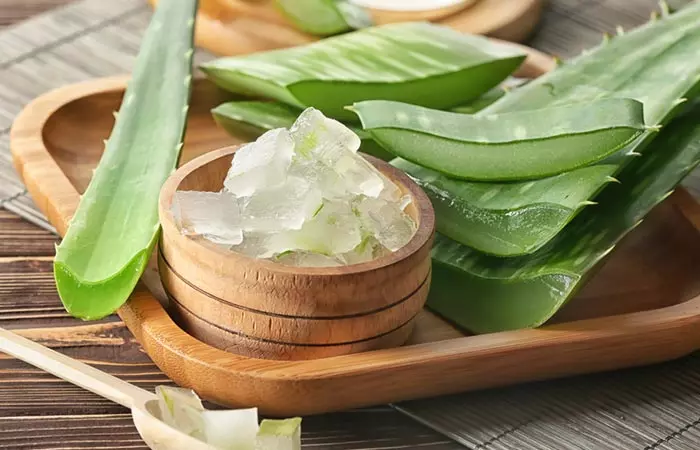
If you are wondering how to get rid of dark spots and seeking a wholesome solution that simultaneously contributes to improving your overall skin health, then aloe vera can be your answer! Aloe vera contains aloini A bitter, yellow-brown crystalline compound found in aloe species that exhibits skin-lightening properties. , a bioactive compound that has an inhibitory effect on melanin (the pigment that gives color to the skin) synthesis (5). This may aid the depigmentation of skin as it acts as a natural whitening agent and may help in brightening up your skin tone.
You Will Need
- 1 tablespoon of fresh aloe vera gel
- 1 teaspoon of brown sugar
What You Have To Do
- Extract the gel from the aloe vera leaf.
- Add brown sugar to the gel and mix well.
- You can apply this to your face and neck.
- Rinse your face thoroughly with water.
How Often Should You Do This
Repeat two times a week.
 Quick Tip
Quick Tip4. Yogurt
Yogurt is very commonly used as a remedy to eliminate excessive pigmentation. It is rich in a bioactive compound that can effectively help in fading and reducing dark spots and other signs of pigmentation (6), (7). It also contains lactic acid, which is a gentle exfoliant that helps remove dead skin cells to give you healthier and even-toned skin (8).
You Will Need
- 1/2 cup of fresh yogurt
- 1-2 teaspoons of honey
What You Have To Do
- Add the honey to half a cup of yogurt.
- Apply this face pack to your neck and face.
- You must leave it on for about 20 minutes before rinsing it off thoroughly with water.
How Often Should You Do This
Do this at least two times a week to see a visible change.
5. Cucumber
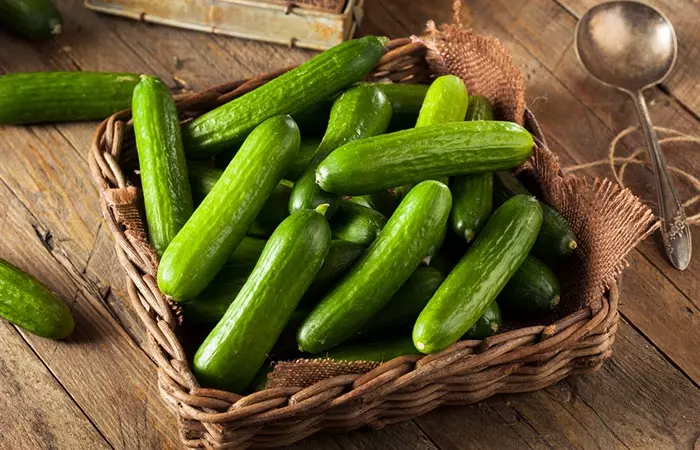
Cucumber is a rich source of cucurbitacini A category of chemical compounds present in vegetables like pumpkin, cucumber, squash, and zucchini, in minute quantities. D and 23, 24-dihydro cucurbitacin D. These compounds can reduce melanin synthesis and possibly aid depigmentation, by reversing the effects of pigmentation (9).
You Will Need
- A fresh cucumber
- Freshly extracted aloe vera gel
What You Have To Do
- Slice a cucumber and blend it.
- Prepare a fine paste by adding some aloe vera gel to it.
- Apply this paste to your face and neck.
- Leave the pack on for 15-20 minutes and wash off with plain water.
How Often Should You Do This
You may do this once a week.
6. Turmeric
Curcumini A chemical compound found in turmeric responsible for its bright yellow color that contains antioxidant and anti-inflammatory properties. is the major component of turmeric, one of the most popular ways to brighten your skin tone. This compound is effective in preventing the appearance of signs of aging, such as blemishes and spots. This may be because turmeric has antioxidant properties that help neutralize free radicals, which are responsible for these issues (10), (4). It also imparts a natural glow to your skin.
A study published in the Phytotherapy Research journal examined research papers about turmeric and its effects on skin problems like acne, aging, damage, and discoloration. Some of them showed that using turmeric led to improvements in these skin conditions. While the results are promising, more research is needed to understand the benefits (10).
You Will Need
- 1 teaspoon of turmeric powder
- Honey
- Fresh yogurt
What You Have To Do
- Prepare a face pack by mixing the ingredients mentioned above.
- Apply the face pack and leave it on until it dries.
- Rinse your face thoroughly with lukewarm water.
How Often Should You This
Use this face pack once a week.
Caution: Turmeric may stain clothing, towels, and skin temporarily. So, be cautious when applying and rinsing. Additionally, it may cause allergic reactions in some individuals. So, perform a patch test to check for adverse reactions, such as redness, itching, or swelling. Discontinue use if you notice any of these signs.
7. Papaya
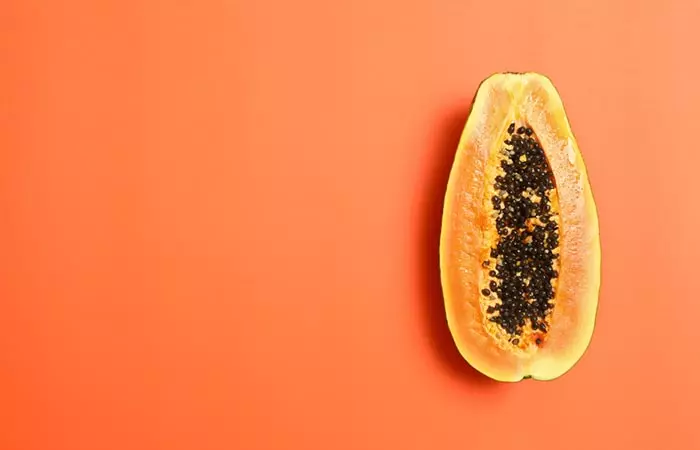
Papaya has been used as a remedy to lighten skin. Its extracts are known to increase the production of collageni A protein in connective tissues, tendons, and ligaments that promotes skin smoothening and elasticity. in your skin. This, in turn, helps in complexion improvement and lightening the appearance of scars and blemishes (11), (12). Papaya also contains vitamin A, which helps increase cell turnover to restore and rebuild damaged skin (12). This, in turn, may help you achieve blemish-free, brighter skin.
You Will Need
- 1 ripe papaya
- 1 ripe lemon
What You Have To Do
- Make a puree by blending the slices of papaya and add a few drops of lemon juice to it.
- Leave it on for about 10-15 minutes.
- Wash off thoroughly.
How Often Should You Do This
You can repeat this two times a week.
Caution: Always use ripe papayas, as unripe papaya releases latex fluid that may irritate the skin (12).
8. Orange Peel
The tanninsi Water-soluble natural compounds found in parts of plants (bark, leaves, seeds, peels) and their foods and beverages. , antioxidants, and polyphenolsi Naturally occurring chemical compounds abundant in plant-based foods that possess antioxidant properties. in orange peel make it an effective remedy to lighten skin tone. These compounds can eliminate free radicals that lead to oxidative stress, which is responsible for skin damage and the formation of dark spots. This, in turn, may help you get rid of dull skin and impart a natural radiance to it (13).
You Will Need
- 1/2 teaspoon of turmeric powder
- 1 teaspoon of powdered orange peel
- 1 teaspoon of honey
What You Have To Do
- Make a fine paste by mixing the ingredients.
- Apply this face pack and leave it on until it dries.
- Rinse off with a mild facial cleanser.
How Often Should You Do This
Use this face pack two times a week.
9. Potato
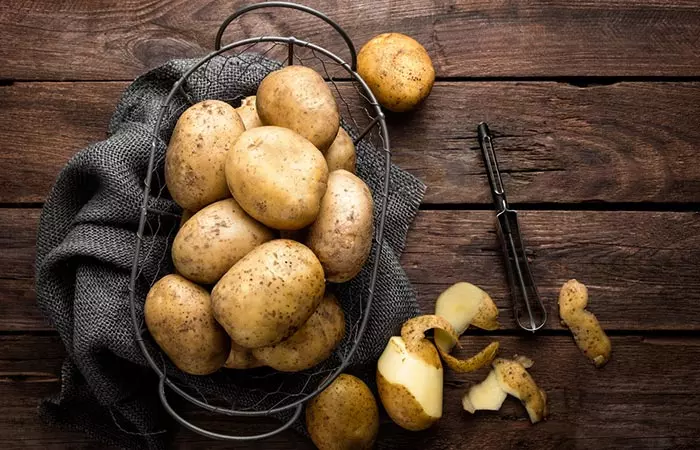
Potato is rich in phytochemicalsi Chemical compounds produced in plants that impart them their flavor, color, and aroma, and might help prevent chronic diseases. , such as potassium, sulfur, and chloride (14). It can help lighten scars and acne blemishes, thereby toning and promoting an even and clear skin tone. Research also suggests that potatoes have antiseptic properties and can help cleanse your skin to slough off dead skin cells. This can give your skin a youthful glow (14). The vitamin C in potatoes also helps fight free radicals to prevent oxidative stress linked to pigmentation and aging (4).
You Will Need
- 2-3 tablespoons freshly extracted potato juice
- Lemon juice
What You Have To Do
- Mix the potato and lemon juices well.
- Use a cotton pad to apply this mixture to your face and neck.
- Leave it on for about 10 minutes before washing it off.
How Often Should You This
Apply this juice to your face two times a week.
Caution: Conduct a patch test on your skin before trying this remedy as it can cause an allergic reaction.
10. Almond Oil
Almonds are abundant in fatty acids, polyphenols, and antioxidants like vitamin E that offer important benefits for skin health (15). Vitamin E is a potent antioxidant that helps fight free radicals to protect the skin cells from damage and pigmentation (16). In a study, those who incorporated almonds into their diet over a 24-week period saw a significant reduction in facial pigmentation (15).
You Will Need
- 1 tablespoon of cold-pressed almond oil
- Cotton ball
What You Have To Do
- Use a gentle cleanser and clean and dry your face.
- Dab a small amount of almond oil onto a cotton ball.
- Apply it to the areas with hyperpigmentation.
- Leave it on for at least 30 minutes and wash it off.
How Often Should You Do This
Use it daily.
Using these tips and tricks diligently for a few weeks can not only lighten your skin tone but also rejuvenate your skin and make it smooth.
While natural skin glowing techniques may offer gentle alternatives, it is important to follow a few safety and precautionary measures to guarantee your skin remains protected and healthy during the entire process.
Key Takeaways
- Apply yogurt to remove dark spots and pigmented marks from the skin.
- Honey contains bioactive compounds that help decrease excessive pigmentation and dark spots.
- Aloe vera is widely known for its skin-soothing properties and may also help lighten your skin tone.
- Use potato juice as it is rich in potassium and chloride, which may lighten scars and acne blemishes.
Safety And Precautions
Even natural ingredients are not entirely safe and may cause adverse reactions. Therefore, before using any of the ways to lighten your skin tone mentioned above, do a patch test to check for symptoms of allergic reactions such as irritation and redness. You may use soothing ingredients, like turmeric or aloe vera, to calm irritation. Practice caution when using acidic ingredients like lemon juice, as it can sensitize the skin. Always dilute it with water before using and use SPF afterward, as lemon juice may make the skin susceptible to UV damage. If you have sensitive skin or any concerns, consulting a dermatologist is a smart step before beginning a new skin care routine.
Apart from the natural remedies mentioned above, various other scientifically-backed ingredients can help you achieve a brighter skin tone. Learn about them in the next section.
Other Scientifically-Backed Ways To Lighten Your Skin Tone
Here are some popular ingredients that are often recommended by dermatologists for a brighter skin tone:
- Vitamin C
Topical Vitamin C serums can reduce melanin production and brighten skin by inhibiting the formation of dark spots. They can also help prevent free radical damage that often causes pigmentation (1).
- Niacinamide
Research suggests that niacinamide can reduce the appearance of dark spots and improve skin tone by blocking melanin transfer to skin cells. Clinical studies have shown this skin care active significantly decreased hyperpigmentation after 4 weeks of consistent use (17).
- Retinoids
Retinoids like retinol increase cell turnover to repair damaged skin. This may help fade dark spots, smooth the skin, and promote a more even complexion (18).
- Chemical Peels
Chemical peels containing alpha and beta hydroxy acids, such as glycolic and salicylic acid, help exfoliate the skin. This helps you get rid of dead skin cells, revealing a brighter skin tone (19).
Infographic: 5 Readily Available Ingredients That Can Help You Lighten Your Skin
Out of the many effective remedies listed above, there are some which are incredibly easy to access and whip up into a face pack in a jiffy. All of them are natural, highly effective at lightening your skin, and regularly found at your local grocery store and vegetable market. Check out the infographic below to know what these magical ingredients are and why they can do what they can do! Illustration: StyleCraze Design Team
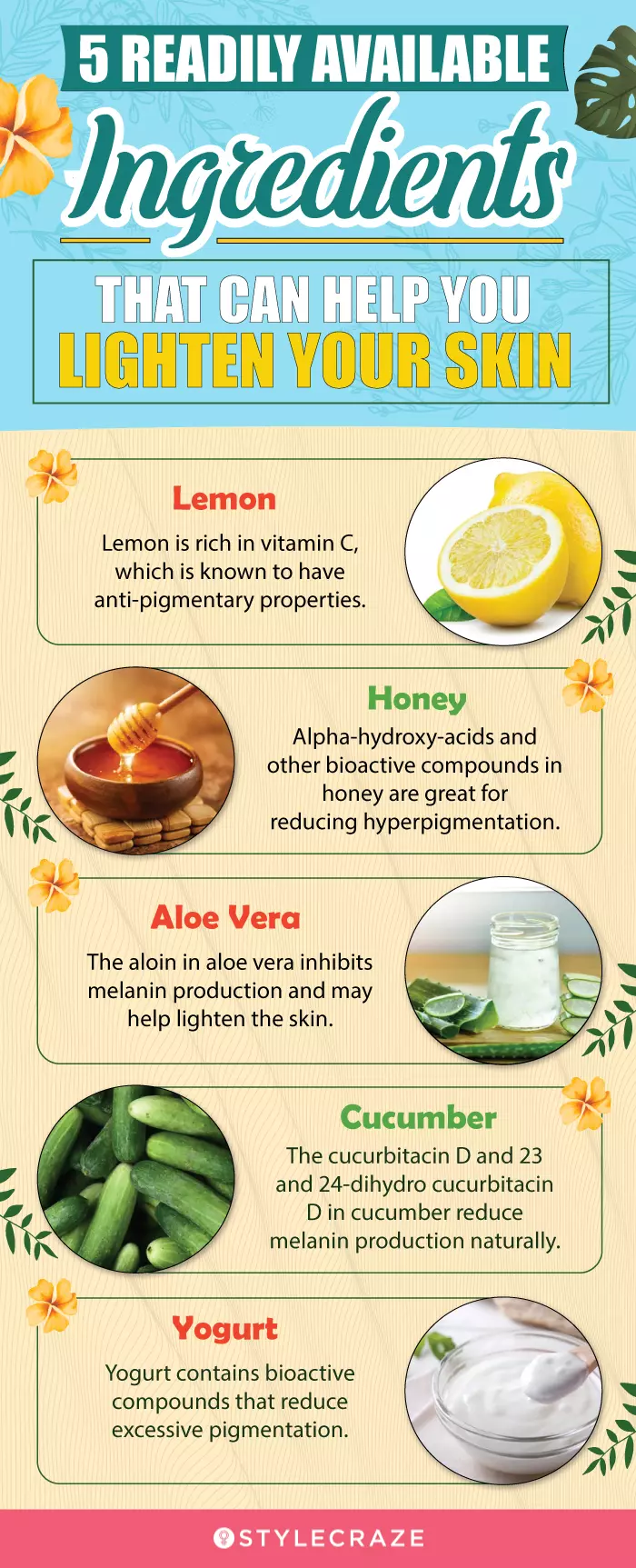
You can choose from the different ways to lighten your skin tone, starting from cosmetic products to procedures to home remedies. If we talk about home remedies specifically, then above-mentioned skin-improving home remedies are a safe and cost-effective option for getting rid of uneven skin tone, removing blemishes and spots, and naturally revealing radiant skin. Lemon, honey, aloe vera, turmeric, cucumber, papaya, orange peel, and potatoes are the most effective natural ingredients that you can apply in different home remedies to help with skin brightening. You need to combine the right ingredients in correct proportions to get optimum benefits for your skin and apply them for a week or two at least.
Frequently Asked Questions
How can I prevent my skin from getting dark?
Dr. Anna Chacon, MD, FAAD, a double board-certified dermatologist, says, “This may be accomplished by applying sunscreen, exfoliating on a regular basis, and protecting your skin from environmental toxins.”
What drinks make your skin glow?
Pomegranate juice and spinach juice are great options for making your skin glow. Dr. Chacon says, “Pomegranate cleanses the blood and helps the skin sparkle. It also possesses anti-aging qualities that aid in cell regeneration, making your skin look younger. Spinach juice is high in iron and vitamin K, all of which are necessary for beautiful skin. It also includes antioxidants vitamin C, E, and manganese, which protect your skin from free radicals.”
Can Vaseline even skin tone?
No, there is currently no evidence suggesting that Vaseline can improve or even your skin tone.
Can tanned skin be white again?
Yes, exfoliating your tanned skin once or twice a week can get rid of the dead skin and grime, giving it a lighter and glowing appearance. You can try out the natural remedies listed above to help exfoliate and clear your skin.
How to get lighter skin using olive oil?
Yes, olive oil contains an antioxidant called oleuropein, which can reduce age spots and lighten your skin (20), (21).
Illustration: Natural Ways To Lighten Your Skin Tone

Image: Stable Diffusion/StyleCraze Design Team
References
Articles on StyleCraze are backed by verified information from peer-reviewed and academic research papers, reputed organizations, research institutions, and medical associations to ensure accuracy and relevance. Read our editorial policy to learn more.
- Topical Vitamin C and the Skin: Mechanisms of Action and Clinical Applications The Journal of Clinical and Aesthetic Dermatology US National Library of Medicine National Institutes of Health.
https://www.ncbi.nlm.nih.gov/pmc/articles/PMC5605218/ - Honey as a Complementary Medicine Integrative Medicine Insights US National Library of Medicine National Institutes of Health.
https://www.ncbi.nlm.nih.gov/pmc/articles/PMC5406168/ - A Fairer Face a Fairer Tomorrow? A Review of Skin Lighteners MDPI.
https://pdfs.semanticscholar.org/48d7/6c8cea60d6873d73ddf8d173cb1b4b70271b.pdf - Free Radicals and Extrinsic Skin Aging US National Library of Medicine National Institutes of Health.
https://pmc.ncbi.nlm.nih.gov/articles/PMC3299230/ - On the novel action of melanolysis by a leaf extract of Aloe vera and its active ingredient aloin potent skin depigmenting agents Planta Medica US National Library of Medicine National Institutes of Health.
https://pubmed.ncbi.nlm.nih.gov/22495441/ - Skin whitening agents: medicinal chemistry perspective of tyrosinase inhibitors Journal of Enzyme Inhibition and Medicinal Chemistry US National Library of Medicine National Institutes of Health.
https://www.ncbi.nlm.nih.gov/pmc/articles/PMC6010116/ - Systemic skin whitening/lightening agents: What is the evidence? IJDVL.
https://ijdvl.com/systemic-skin-whitening-lightening-agents-what-is-the-evidence/ - Lactic Acid Chemical Peeling in Skin Disorders US National Library of Medicine National Institutes of Health.
https://pmc.ncbi.nlm.nih.gov/articles/PMC11055559/ - Exploring cucumber extract for skin rejuvenation African Journal of Biotechnology.
https://academicjournals.org/article/article1380726732_Akhtar%2520et%2520al.pdf - Effects of Turmeric (Curcuma longa) on Skin Health: A Systematic Review of the Clinical Evidence Phytotherapy Research US National Library of Medicine National Institutes of Health.
https://pubmed.ncbi.nlm.nih.gov/27213821/ - Wound-healing potential of an ethanol extract of Carica papaya (Caricaceae) seeds International Wound Journal US National Library of Medicine National Institutes of Health.
https://pubmed.ncbi.nlm.nih.gov/22296524/ - Traditional and Medicinal Uses of Carica papaya Journal of Medicinal Plants Studies.
https://www.plantsjournal.com/vol1Issue1/Issue_jan_2013/2.pdf - Evaluation of Skin Anti-aging Potential of Citrus reticulata Blanco Peel Pharmacognosy Research US National Library of Medicine National Institutes of Health.
https://www.ncbi.nlm.nih.gov/pmc/articles/PMC4908842/ - Health Benefits and Cons of Solanum tuberosum Journal of Medicinal Plants Studies.
https://www.plantsjournal.com/vol1Issue1/Issue_jan_2013/3.pdf - Prospective Randomized Controlled Trial on the Effects of Almonds on Facial Wrinkles and Pigmentation
https://www.ncbi.nlm.nih.gov/pmc/articles/PMC7997170/ - Vitamin E in dermatology US National Library of Medicine National Institutes of Health.
https://pmc.ncbi.nlm.nih.gov/articles/PMC4976416/ - The effect of niacinamide on reducing cutaneous pigmentation and suppression of melanosome transfer US National Library of Medicine National Institutes of Health.
https://pubmed.ncbi.nlm.nih.gov/12100180/ - Retinoids: active molecules influencing skin structure formation in cosmetic and dermatological treatments US National Library of Medicine National Institutes of Health.
https://pmc.ncbi.nlm.nih.gov/articles/PMC6791161/ - Chemical Peels for Skin Resurfacing US National Library of Medicine National Institutes of Health.
https://www.ncbi.nlm.nih.gov/books/NBK547752/ - Oleuropein in Olive and its Pharmacological Effects
https://www.ncbi.nlm.nih.gov/pmc/articles/PMC3002804/ - The olive: A natural supplier of active ingredients for skin lightening and age spot reduction
https://www.researchgate.net/publication/290322864_The_olive_A_natural_supplier_of_active_ingredients_for_skin_lightening_and_age_spot_reduction
Read full bio of Dr. CP Thajudheen
- Dr. Anna Chacon, MD, FAAD, is a double board-certified dermatologist with over 7 years of experience. She has authored many peer-reviewed articles and managed clinical research studies during her fellowship. She completed her medical school in the PLME (Program of Liberal Medical Education) at Brown University.
 Dr. Anna Chacon, MD, FAAD, is a double board-certified dermatologist with over 7 years of experience. She has authored many peer-reviewed articles and managed clinical research studies during her fellowship. She completed her medical school in the PLME (Program of Liberal Medical Education) at Brown University.
Dr. Anna Chacon, MD, FAAD, is a double board-certified dermatologist with over 7 years of experience. She has authored many peer-reviewed articles and managed clinical research studies during her fellowship. She completed her medical school in the PLME (Program of Liberal Medical Education) at Brown University.
Read full bio of Shaheen Naser
Read full bio of Anjali Sayee
Read full bio of Monomita Chakraborty







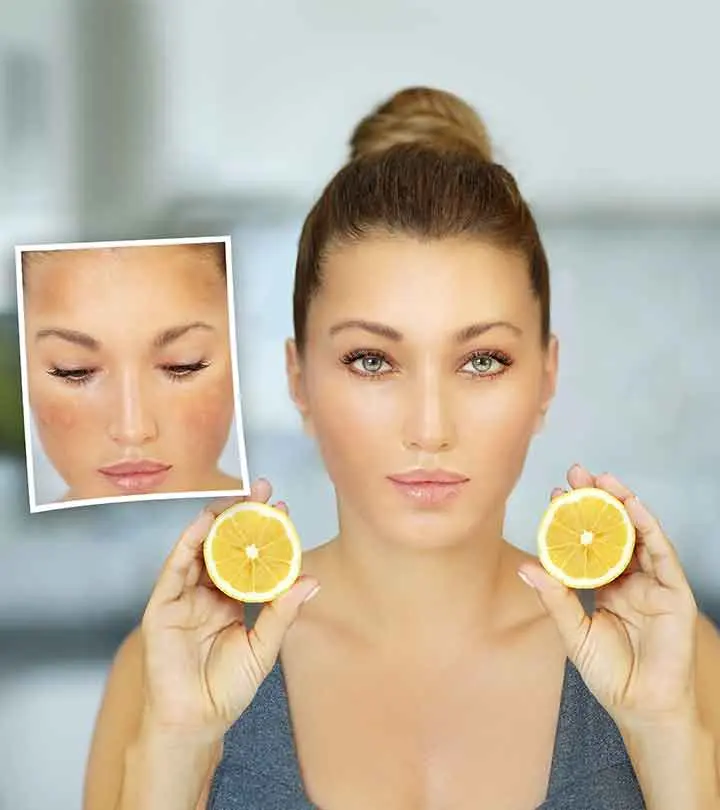




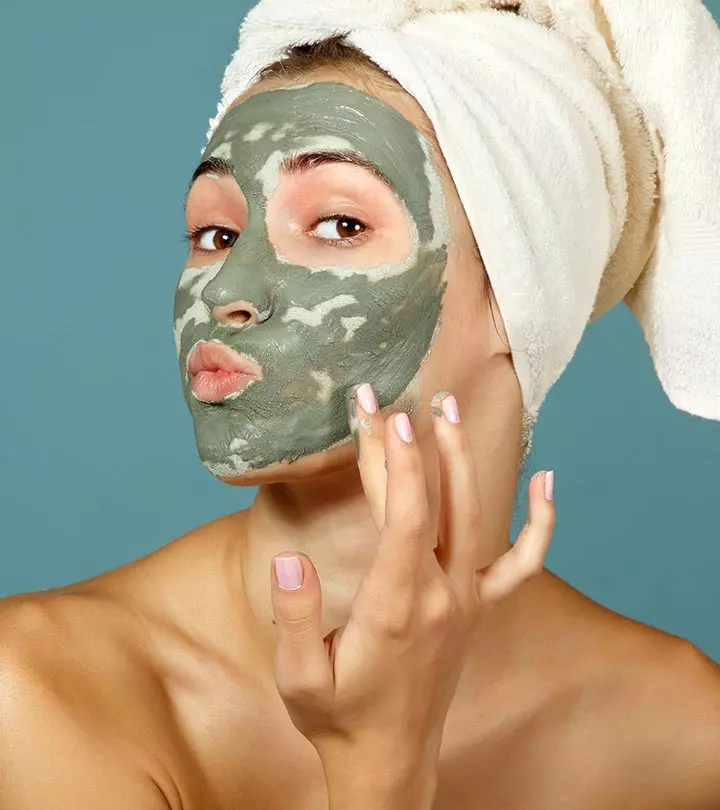

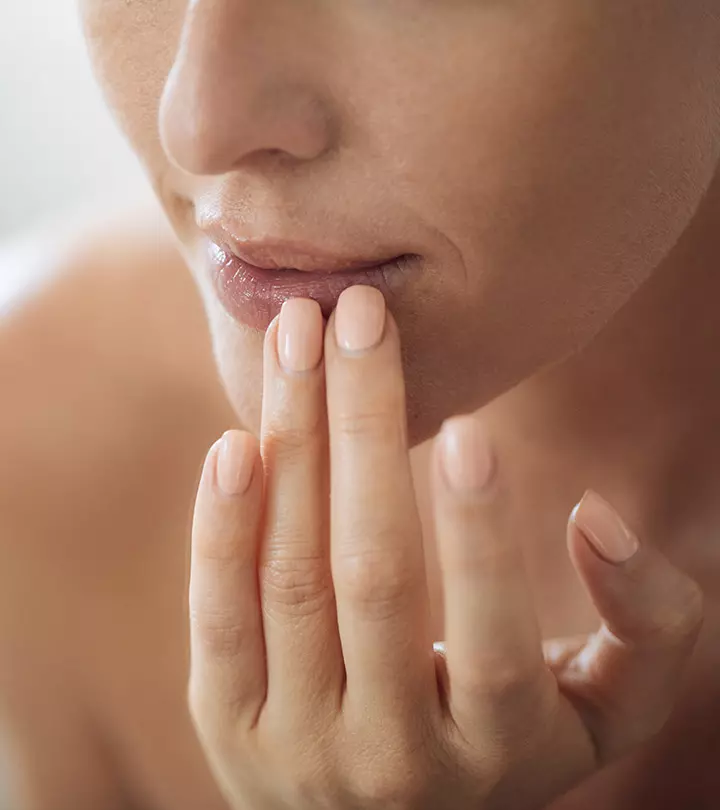




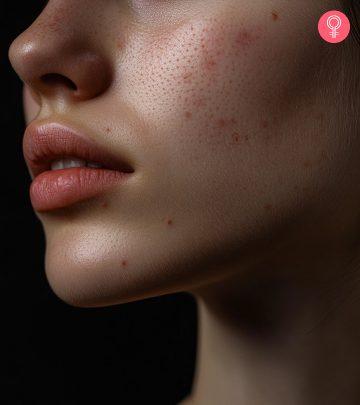

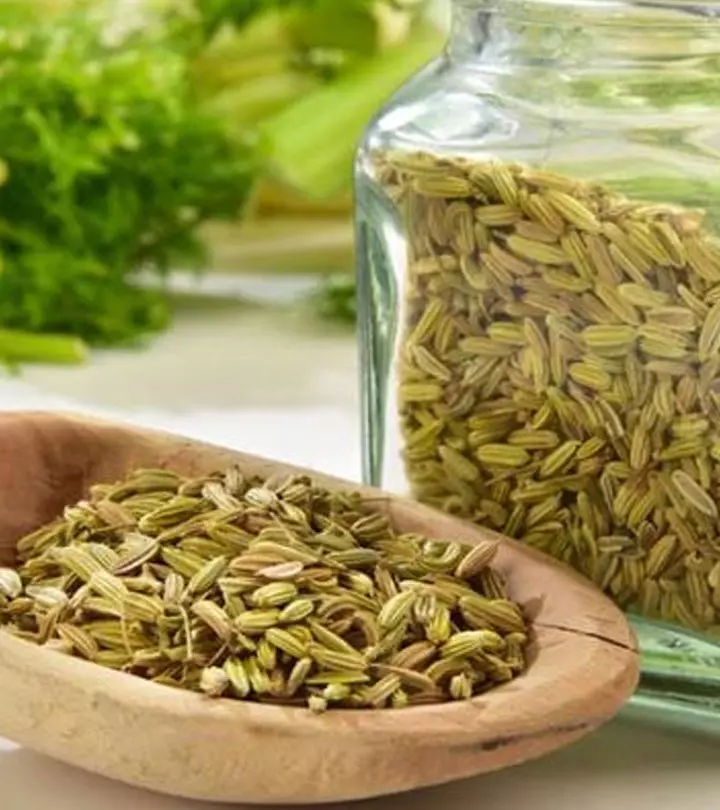

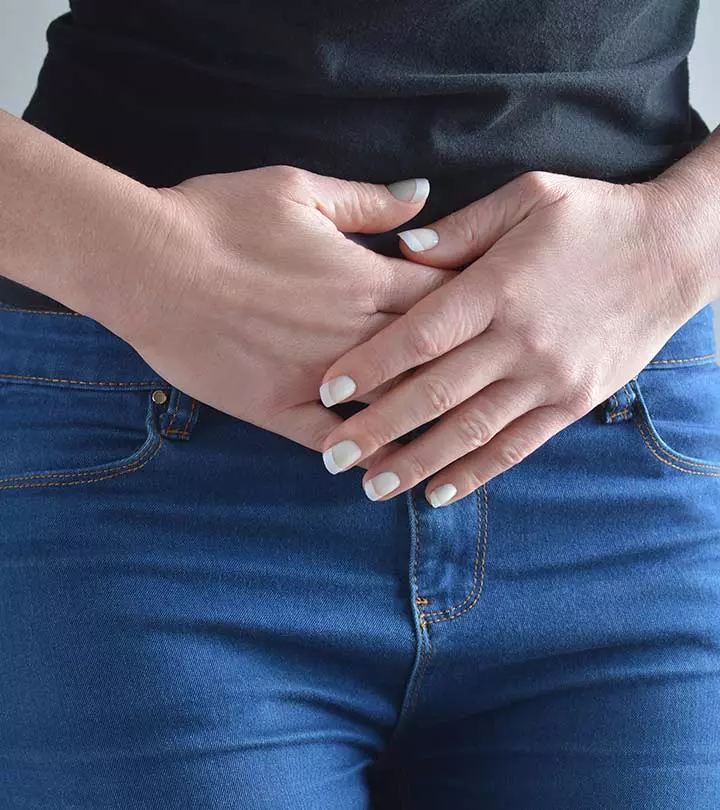
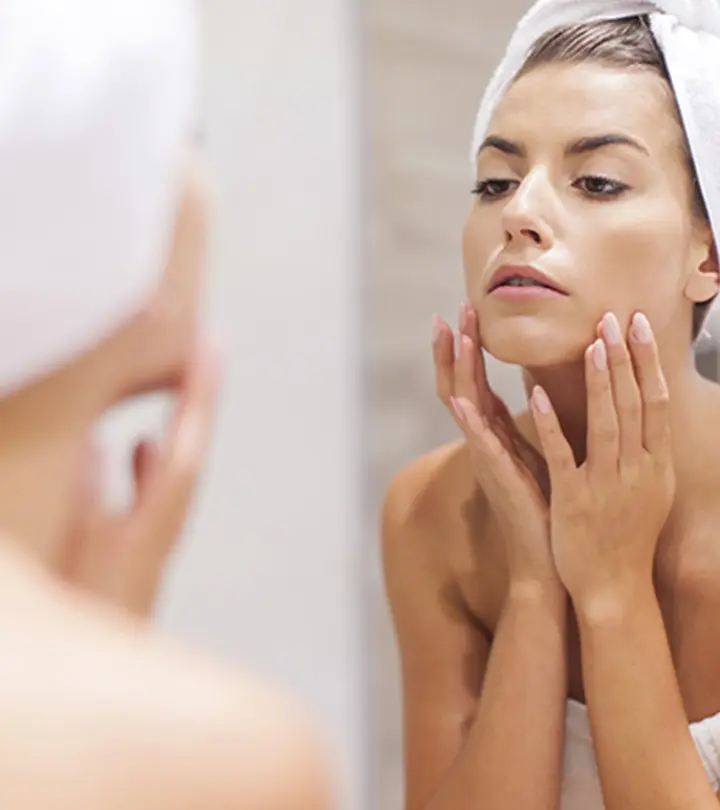
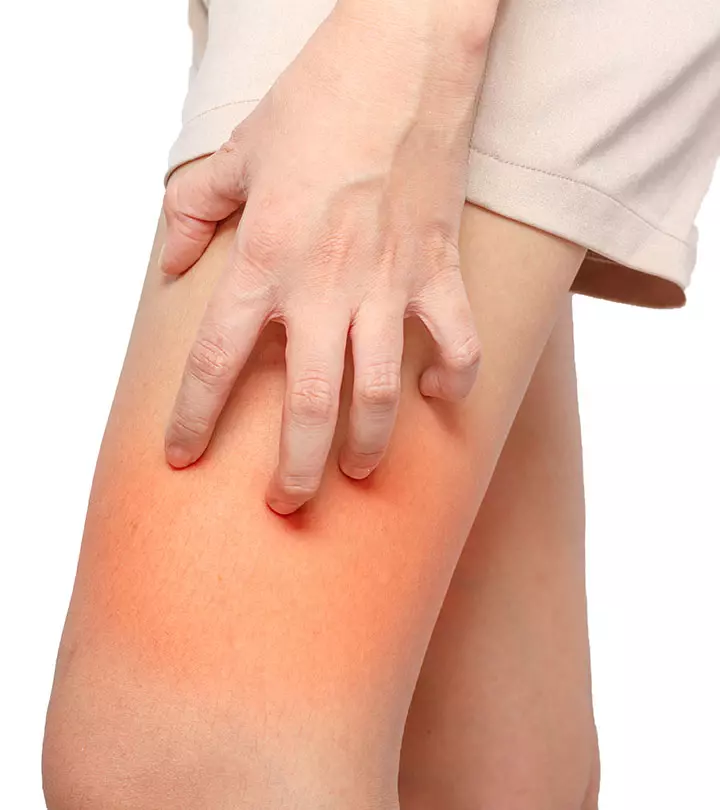


Community Experiences
Join the conversation and become a part of our empowering community! Share your stories, experiences, and insights to connect with other beauty, lifestyle, and health enthusiasts.